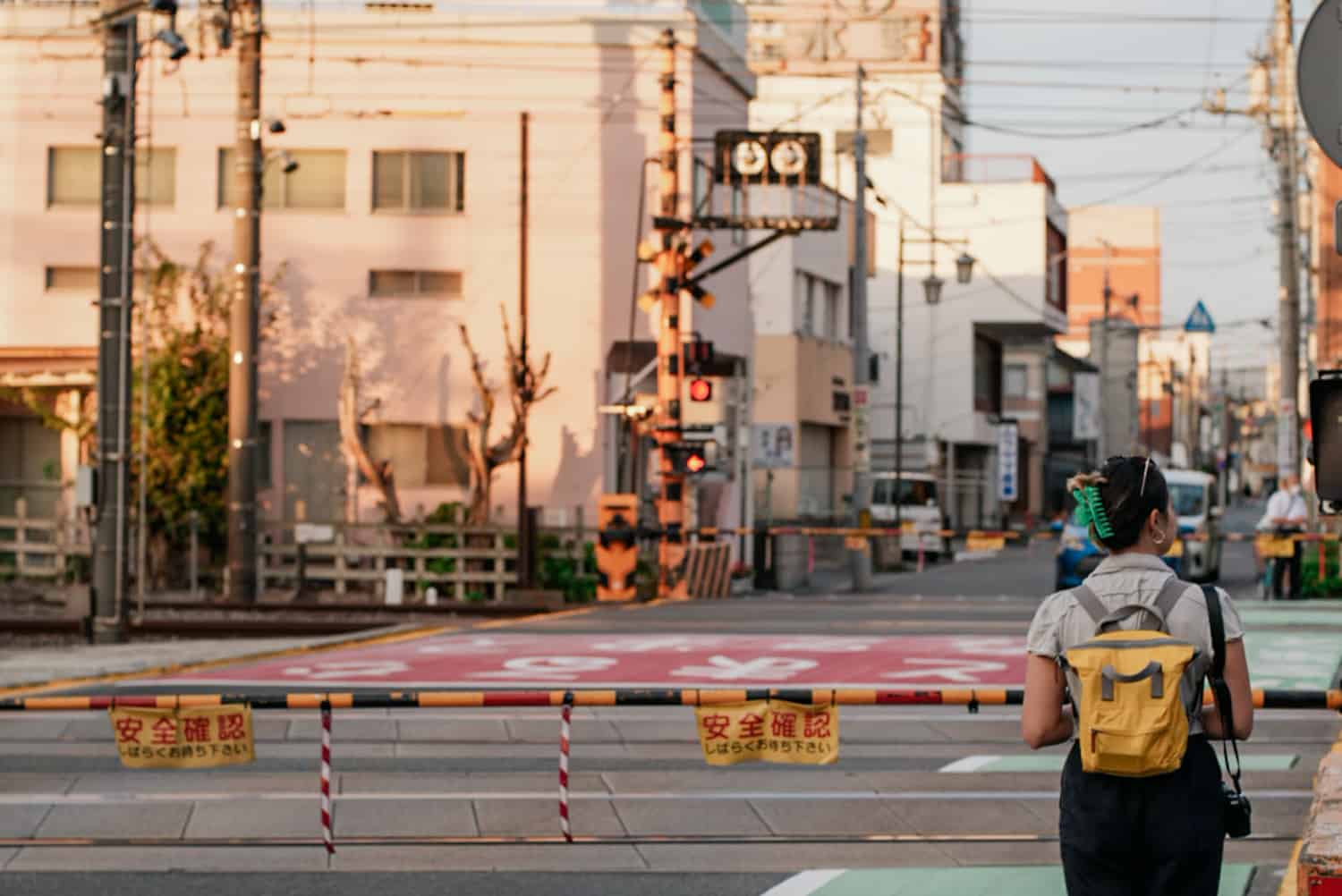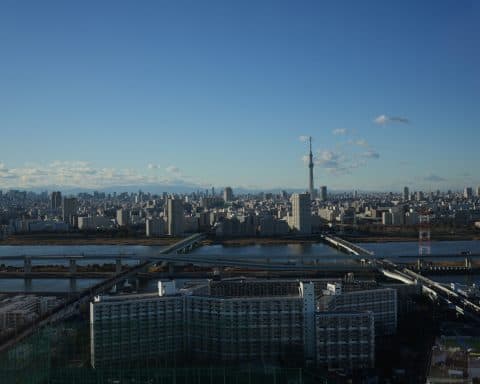Life in Japan is great. I wholeheartedly suggest anyone thinking about living here to make that leap of faith and do it. However, it’s not all sunshine and roses and that’s something that a lot of you should take into account before making the decision.
As such, I’ve made a list of 32 pros and cons of living in Japan. All of which I’ve taken from my own experience of living here for the past year.
If you’re still unsure about whether you should move to Japan, take a look at this quiz I’ve made specifically to help you figure that out. Anyway, on with the (absolutely gigantic) list!
1. Pro: Rich cultural scene
Japan’s rich cultural heritage is a fantastic reason to consider living here. It’s a country where centuries-old traditions coexist with modernity. From ancient tea ceremonies and calligraphy to the contemporary world of anime and J-pop, Japan offers a diverse environment to live in.
You can explore historic temples and shrines that stand alongside towering skyscrapers, attend traditional festivals, and engage in activities like martial arts or any number of Japanese hobbies.
The seasonal celebrations, such as cherry blossom viewing in Spring (hanami) or Summer festivals (matsuri), are experiences you won’t find anywhere else. Whether you’re savoring authentic Japanese cuisine in a local izakaya, meditating in tranquil Zen gardens, or simply participating in everyday customs, the culture you’ll experience in this country is one of the most popular reasons you should live in Japan.
2. Con: High cost of living
Now, let’s talk about the high cost of living in Japan, something I’ve unfortunately experienced firsthand during my time here.
First up, it’s important to be aware that Japan consistently ranks as one of the most expensive countries to live in.
From housing to groceries, daily expenses can quickly add up. Rent for even a modest apartment in the major cities can be quite steep, and property sizes tend to be smaller compared to what you might be used to. On the bright side, there’s often a fair amount of accommodation choice, though.
The cost of food can also be higher than in many other countries, especially if you prefer imported or specialty items. Fruit is one example, and while I’m not saying all Japanese fruit is expensive, it’s certainly more of a treat for us.
However, one of the main things people often complain about being expensive is the public transport system, something which I’ve had the complete opposite experience with. Perhaps that’s because I used to live in the UK because honestly, they don’t seem to be too bad!
That being said, there are ways to manage expenses, like seeking out more affordable housing options (box room, anyone?…) or dining at a number of cheap places.
3. Pro: Exceptional public transportation
Talking of the public transport system in Japan, it was one of the main reasons I decided to live here. I’ve found it to be one of the most convenient and efficient ways to get around, and it’s a significant advantage of living here.
Firstly, Japan’s trains are renowned for their punctuality and reliability. The extensive network connects cities, towns, and even the most remote rural areas, making it remarkably easy to explore the country.
They’re clean, safe, and easy to navigate, with signs and announcements often in both Japanese and English (for the most part). The convenience of public transportation extends to buses and trams, too, ensuring that you can reach your destination efficiently, even if it’s off the beaten path.
As I don’t own a car, these have been an absolute live saver while living here in Japan!
So, whether it’s commuting to work, embarking on a weekend adventure, or simply getting around town, Japan’s public transportation system is a massive plus and definitely a reason you should live in Japan.
4. Con: Language barrier for non-Japanese speakers
Now, let’s address a significant challenge that non-Japanese speakers often encounter when living in Japan: the language barrier. I’ve faced this hurdle personally, and it’s crucial to be aware of it before making the decision.
While Japan is a modern and developed country, English proficiency among the general population, particularly outside major urban centers, can be quite limited. Signs, menus, and official documents are often primarily in Japanese, which can be daunting if you don’t speak or read the language.
If you’re in the process of learning Japanese, then this could technically come under the pros and cons of living in Japan, but I’m telling you now that either way, it won’t be easy.
This language barrier can affect various aspects of daily life. Simple tasks like grocery shopping or ordering food can become challenging without basic Japanese language skills. Communication with healthcare providers, government offices, or in emergencies can be even more complex.
While there are efforts to make Japan more accessible to non-Japanese speakers, such as increased English signage in major cities, learning at least some basic Japanese can greatly improve your experience living here. It’s worth considering language classes or language exchange programs to help bridge this gap.
It’ll be pretty isolating if you live in Japan and can’t speak the language, especially if you’re based outside a major city.
5. Pro: Low crime rates
You’ve probably heard it before, but one of the main reasons you should consider living in Japan is the remarkably low crime rates.
Japan consistently ranks as one of the safest countries globally, particularly when it comes to violent crimes. Major cities like Tokyo, Osaka, and Kyoto boast incredibly low crime rates, and even in less urban areas, the feeling of security is always there.
This means you can confidently explore the city at night (though maybe give Kabukicho a miss!), let your children walk to school independently, or even leave your bicycle unlocked without fearing theft.
I mean, things still happen so while you can do most things, that’s not to say you definitely should. However, I’ve not once felt intimidated or been under the impression that my belongings were at risk of being taken.
6. Con: Intense work culture with long hours
If you work for a Japanese company as opposed to a Western one, you’re likely to be at the mercy of the infamously intense work culture.
In Japan, it’s not uncommon for employees to work extended hours, including overtime and weekends. This work ethic can lead to a demanding and exhausting work-life balance, with many individuals feeling pressured to prioritize work over personal time and family.
For expatriates, adapting to this work environment can be particularly challenging, as it may clash with expectations or practices from their home countries. It’s essential to be prepared for the potential impact on your personal life and free time when considering a move to Japan.
If you’re looking for a more chilled-out time at work, unless you’re working for a forward-thinking company then this may be one of the reasons you shouldn’t live in Japan. And this is all before we’ve even mentioned the strange ‘work laws’ like not leaving before your boss, turning up an hour before your shift and not being paid, and not taking your jacket off if it’s hot, among others.
7. Pro: High-quality healthcare system
Coming from the UK, I was a little concerned about moving to Japan where you do technically have to pay for health insurance. However, that quickly changed when I realized I only have to pay monthly insurance (fairly cheap) and then 30% of the hospital bill while the government pays the other 70%.
Japan’s healthcare system is known for its excellence and accessibility. Medical facilities are mainly modern, well-equipped, and staffed by highly trained professionals who maintain rigorous medical standards. Whether you’re a resident or a visitor, on the whole, you can expect top-notch medical care.
What’s particularly commendable is the emphasis on preventive care. Regular health check-ups are actively encouraged and often subsidized (I’ve applied for a few jobs in Japan that include this), ensuring that potential health issues are identified early. Health insurance, as we just spoke about, is mandatory for residents and is designed to be both affordable and comprehensive.
As far as the healthcare system is concerned, it’s definitely a reason you should live in Japan. If you’re from the US, I’d imagine it will be far cheaper than what you’re used to.
8. Con: Limited living space in major cities
In densely populated urban areas, space comes at a premium. Apartments and houses tend to be compact, which can be quite an adjustment if you’re accustomed to more spacious living quarters. It’s not unusual to find living spaces that are cozy, to say the least, and this can be particularly noticeable if you have a family.
The limited living space extends to storage as well. Many apartments don’t have the generous closets or storage areas found in some other countries, so efficient organization becomes a necessity. Additionally, rent prices in major cities can be relatively high, further emphasizing the need for careful budgeting and space optimization.
While this may not be a deal-breaker for everyone, it’s important to be prepared for the potential adjustment if you’re considering living in Japan’s bustling urban centers. Balancing the convenience of city life with the limited living space is a practical consideration that many people contend with.
On the plus side, there are a lot of places available to rent, so technically no matter what your budget is, you’ll be able to find something. It might just be a little… boxy!
9. Pro: Beautiful natural landscapes
One of the incredible pros of living in Japan is the opportunity to immerse oneself in its stunning natural landscapes. These breathtaking natural wonders are something I’ve come to fall in love with during my time here.
The country is renowned for its beautiful cherry blossoms in spring, which blanket parks and streets in delicate pink hues. The vibrant foliage of autumn is equally mesmerizing, with fiery red and golden leaves transforming the countryside.
For outdoor enthusiasts, Japan offers abundant opportunities for hiking, skiing, and exploring its national parks. Iconic spots like Mount Fuji, the Japanese Alps, and the lush countryside of Kyoto provide a scenic backdrop for adventure and relaxation alike.
One of the best things about this is how close they are to cities, sometimes they’re practically intertwined. Whether it’s a leisurely walk in a local park or an ambitious trek through pristine wilderness, Japan’s natural landscapes are easily one of the best reasons to live here.
Japan is beautiful, and there’s simply no getting around it.
10. Con: Earthquake and natural disaster risk
Living in Japan does come with the drawback of being exposed to a relatively high risk of earthquakes and natural disasters, and this is a factor that residents, including myself, need to be mindful of.
Japan sits along the Pacific Ring of Fire, a volatile zone prone to seismic activity. Earthquakes are relatively common occurrences. While stringent building codes and early warning systems are in place, the potential for strong earthquakes is a part of life here.
I’ve been in a number of earthquakes during my time living in Japan, though the vast majority of them are basically just glorified wobbles.
In addition to earthquakes, Japan is also susceptible to other natural disasters like typhoons (there’s one poking around at the moment I think…), tsunamis, and volcanic eruptions. Typhoon season, in particular, can disrupt daily life with heavy rains and strong winds.
Being prepared for these events is essential. It’s advisable to have an emergency kit, be informed about evacuation procedures, and have a plan in place in case of natural disasters. While the risk is a reality, Japan’s infrastructure and preparedness measures help mitigate the impact. Nonetheless, this is an aspect of living in Japan that requires vigilance and readiness.
11. Pro: Tasty food
I think this is going to be a reason you should move to Japan for a lot of people. Moving to Japan almost certainly means changing your day-to-day diet, and that’ll have more of an effect on you than you might realize.
The food over here is diverse and offers an array of flavors and textures. From the simplicity and elegance of sushi to the comforting warmth of ramen and the sizzle of teppanyaki, there’s something for everyone.
Whether you’re dining at a Michelin-starred restaurant or grabbing a quick bite from a street vendor, the quality of the food is pretty damn great.
What’s more, each region of Japan boasts its own unique dishes and specialties, making eating food in Japan an ongoing adventure. The emphasis on seasonality means you’ll always find fresh, ingredients in your meals, that’s something I’m not complaining about!
12. Con: Strict immigration policies
Yup, this is one that’s affected me more than a few times.
One of the significant drawbacks I’ve encountered while living in Japan is the country’s strict immigration policies. These policies, as you might have guessed, can present challenges for foreigners who wish to live and work in Japan.
Japan’s immigration regulations are known for their complexity and often bureaucratically annoying processes. Obtaining a long-term visa, especially for work purposes, can be a lengthy and sometimes arduous process. The criteria for eligibility can be stringent, and the documentation and paperwork required can be quite extensive.
Additionally, there are limited options for permanent residency, and the process can be demanding. For the most part, the government’s approach to immigration is cautious, which means that even skilled professionals or individuals seeking to reunite with family members may face obstacles in securing the necessary visas.
While Japan has taken steps to make its immigration policies more accessible and welcoming to foreigners, it remains a challenging aspect for many expatriates. I’m fairly certain they released another type of visa in an effort to lure high earners to the country but you have to have graduated from one of the world’s top universities to qualify… -_-
13. Pro: Pop culture scene
Japan’s pop culture is known worldwide for its impact on music, fashion, film, anime, manga, and more. The influence of pop culture is plain to see in practically every part of the country, from the bustling streets of Tokyo to the smallest towns.
I suppose the pop culture scene in Japan is a testament to its ability to continually reinvent and reinterpret its traditions. Of course, it only ever reinvents itself for the Japanese market, and as we know from Japanese dramas, Japanese Horror, and J-Pop, that’s not too much.
But after all the time I’ve lived here, I still find this slightly wacky side of Japan exciting. It’s not just the people who come on holiday to experience it who get to enjoy it!
14. Con: Limited career advancement for foreigners
Japan’s job market is highly competitive and can be challenging for non-Japanese individuals seeking career growth. While many multinational companies in Japan actively recruit foreign talent, some traditional Japanese companies will definitely have more rigid structures and cultural barriers that can hinder career progression for foreigners.
Of course, language can also be a significant barrier to career advancement unless you’re teaching English.
That said, it’s not impossible to advance in your career in Japan as a foreigner. Networking, seeking out international or English-speaking companies, and continually improving your language skills can help overcome some of these barriers.
One area I know from researching and going to networking events myself that’s always actively hiring is the developer field. So if you’re a front-end engineer or fancy learning some of the in-demand languages, head over to Tokyo Dev to secure your dream job! 😉
15. Pro: Excellent education system
I didn’t go to school in Japan, but my partner did in her early years so I can attest to how good it is during that period. In the higher years, things get a bit more complicated but that’s a discussion for another day.
Another noteworthy aspect is the focus on character education, teaching values such as respect, responsibility, and diligence alongside academic subjects. This holistic approach aims to develop well-rounded individuals who contribute positively to society, and one way we can see that this has worked is through Japan’s clean streets.
For expatriates with families, Japan’s education system offers international schools with English-language instruction, ensuring that children can receive a quality education even if they are not fluent in Japanese. While that sounds like a good option, particularly in a child’s later years, the fees can be absolutely huge!
16. Con: High population density in urban areas
One of the significant drawbacks of living in Japan, particularly in its urban areas, is the high population density. This is something I’ve experienced first-hand and is a characteristic that can have both practical and lifestyle implications.
Japan is known for being crowded, and cities like Tokyo and Osaka are among the most densely populated in the world. As a result, the living spaces in these areas can be compact, and real estate prices can be relatively high, which may limit your housing options.
Additionally, the high population density can lead to crowded public transportation during rush hours (they literally hire people to squeeze you into the trains), longer commutes, and more people at attractions or using local services.
On the bright side, Japan’s urban areas are known for their efficiency, convenience, and access to a wide range of amenities and services. While high population density can present challenges, it’s also an integral part of what makes Japanese cities vibrant and dynamic. For many, the benefits of urban living in Japan outweigh the drawbacks, but it’s a factor to consider when contemplating a move to the country.
17. Pro: Clean Cities
A fantastic pro of living in Japan is the cleanliness of its streets and cities. This is an aspect of daily life that I’ve found particularly refreshing during my time here. The UK on the other hand really isn’t known for being clean…
Japanese cities are renowned for their cleanliness, orderliness, and impeccable public spaces. You’ll often encounter well-maintained streets, parks, and public facilities. Littering is uncommon, and there’s a strong cultural emphasis on keeping public areas clean.
And all of this with practically 0 public trash cans. It’s honestly very impressive, and you kind of get used to carrying rubbish around with you until you happen upon one or you get back home.
18. Con: Limited acceptance of diversity
Japan is a relatively homogeneous society, with a strong emphasis on cultural and social conformity. As a result, foreigners, particularly those who visibly stand out due to their ethnicity, may sometimes experience a sense of being different or even face discrimination. While overt discrimination is not prevalent, subtle forms of bias can exist.
I should point out that I’ve never encountered anything like this, but a number of people I know have done. It’s easy to see how this can sometimes lead to feelings of isolation or exclusion, especially in more rural or less cosmopolitan areas. It can also affect employment opportunities and social interactions.
19. Pro: Efficient public services
I bet you’ve heard about this one before! If you’re looking for a day-to-day life with convenient public transport links and a reliable way of getting around, this is a great reason to live in Japan. And to be fair, the majority of Japan’s public services are pretty darn efficient too.
Japanese public services are of course well known for their reliability and effectiveness. Everything from transportation systems to healthcare and government services operates with a high level of efficiency. For example, trains and buses run on precise schedules, and public infrastructure is well-maintained.
The healthcare system, as we’ve talked about, is also marked by efficiency with short waiting times for appointments and a focus on preventive care. Access to medical services, even in rural areas, is generally readily available.
However Government services, like things to do with visas and taxes, have always been very friendly and helpful, but are often tripped up by red tape and mountains of pointless paperwork. I’d say it’s one of the only public services that’s really not efficient.
20. Con: Complex and hierarchical social norms
Living in Japan, I’ve experienced the complexities and hierarchical nature of its social norms, which can be both intriguing and challenging aspects of daily life.
Japanese society is characterized by a set of intricate social customs and hierarchies that dictate behavior in various contexts. These norms can sometimes be difficult for foreigners to fully grasp and navigate. For example, there are specific rules for gift-giving, greetings, and interactions in business settings that may not be immediately intuitive. Business settings for example, are something I still have no idea about after living in Japan for the past year.
Hierarchy plays a significant role in Japanese culture, with age, status, and seniority often determining your position in social and professional relationships. This can affect communication styles and decision-making processes. It’s essential to be aware of and respect these hierarchies to build positive relationships and avoid unintended cultural misunderstandings.
However, many Japanese people are understanding and forgiving of cultural differences, and efforts to learn and respect these social norms are often appreciated, especially if you’re a foreigner.
21. Pro: Strong work ethic
Ok, depending on what this refers to, it could technically be a con as well…
If you work for a Western company and love the work you do, then one of the significant pros of living in Japan is the strong work ethic prevalent in the culture. Japanese professionals are known for their dedication, diligence, and commitment to their jobs. This work ethic is evident in the emphasis on punctuality, reliability, and putting in extra effort to ensure the success of projects and companies.
Japanese employees take pride in their roles and often collaborate effectively to achieve common goals. This spirit of cooperation fosters a productive work environment and creates a strong sense of camaraderie among colleagues.
However, I can understand that through this constant sense of ‘teamwork’ it may be hard to move up within a company, and promotions might be based on the time you’ve spent there as opposed to the work you’ve done.
22. Con: Difficulties in obtaining permanent residency
Living in Japan comes with a particular challenge, especially for expatriates: the intricate and demanding process of obtaining permanent residency (PR) or long-term visas.
Japan maintains rigorous immigration policies governing the issuance of PR and long-term visas to foreign residents. These policies entail meeting stringent criteria, such as income thresholds, duration of residence, and contributions to Japanese society.
I’m fairly certain you can get permanent residence if you’ve got a skilled visa in as little as a year, but I don’t imagine this is all that common.
23. Pro: Unique festivals and traditions
Japan boasts a frequently busy calendar of festivals, each offering a distinct and vibrant cultural experience. These festivals often celebrate ancient traditions, seasonal changes, or historical events, and they provide a window into Japan’s history and heritage.
From the dazzling cherry blossom festivals (hanami) in spring to the lively summer festivals (matsuri) with traditional dances and vibrant parades, there is no shortage of celebrations to enjoy throughout the year. Participating in these festivals will allow you to forge connections with local communities, experience the warmth of Japanese hospitality, and gain insights into the country’s customs and values.
As I live in a homestay with a Japanese family, I’ve been lucky enough to experience most of these events throughout my time here. The matsuri in particular makes the summer heat a lot more bearable!
24. Con: Air pollution in some urban areas
Again, this could be true of any country, but as Tokyo is the biggest city in the world, it’s certainly possible you’ll experience it here as well.
For individuals with respiratory conditions or sensitivities, or those who are particularly concerned about air quality, this can be a significant drawback to living in certain urban areas of Japan. It’s advisable to research specific cities or regions to understand their air quality conditions, as this can vary widely throughout the country.
I’ll be honest, I’ve seen and been affected by far worse air quality conditions on my 3-week holiday to China than I’ve ever been in my year living in Japan. So, while this could be an issue, it’s not likely to affect you as badly as other places in the world.
25. Pro: Politeness and respect in society
Politeness and respect are deeply ingrained in Japanese culture, and it’s evident in the way people interact with one another. We’ve talked before about how this starts from a young age in schools, and it’s evident to see that it continues into adulthood.
Common courtesies like bowing, using honorific language, and demonstrating patience and consideration in public spaces are everyday norms. This contributes to a sense of order and harmony in society and absolutely makes living in Japan a pleasure.
In Japanese society, there is a strong emphasis on maintaining positive relationships and minimizing conflict. People tend to be conscientious and mindful of others, which enhances the overall sense of safety and well-being in the community.
26. Con: Bureaucracy
The paperwork… SO MUCH PAPERWORK!
Japan has a complex bureaucratic system, and navigating it can sometimes be time-consuming and challenging, especially for expatriates who may not be familiar with the intricacies of the system or have the language skills to navigate it effectively.
Whether it’s obtaining a visa, dealing with tax matters, or even basic administrative tasks, individuals may find themselves facing layers of paperwork, numerous requirements, and sometimes (often…) confusing procedures.
Also, many official documents and processes are conducted in Japanese, and even those available in English may not cover all aspects.
However, it’s worth noting that there are support services and resources available to help expatriates navigate the bureaucratic landscape, including assistance from expat communities, relocation agencies, and local government offices.
Friends of mine who live in Shibuya say there’s an English translator service, so I suppose all hope is not lost!
27. Pro: Access to hot springs (onsen)
You’re damn right I’m putting this as one of the reasons you should live in Japan!
Japan is blessed with a wealth of natural geothermal springs, and onsen can be found throughout the country, from rural areas to cities. These hot springs are celebrated for their healing properties, relaxation benefits, and the natural settings in which they are often located.
Enjoying an onsen experience is not only a way to relax after a hard day’s work but also a cultural tradition deeply rooted in Japanese society. Many people visit onsen regularly to de-stress, improve their skin, and alleviate muscle aches and pains.
Whether you’re living in a rural area with access to a local onsen or residing in a city with nearby onsen facilities, the opportunity to enjoy them is a cherished perk of living in Japan for many, myself included!
28. Con: Expensive healthcare
We briefly talked about this earlier on in the article as a Pro, but the reality is that the Japanese healthcare system can come under the pros and cons of living in Japan. For instance, it’s expensive compared to what I’m used to from the UK, but in reality, it’s actually very reasonably priced for people who’ve lived in other parts of the world.
Japan has a universal healthcare system that provides residents with access to high-quality medical care. However, medical costs in Japan, even for routine check-ups or minor treatments, can be substantial compared to some other countries. If you haven’t signed up for the national insurance then this is definitely going to be the case, but if you have, then you’ll only need to pay 30%.
Often, you’ll be able to have this paid through your employer, but if you’re working self-employed or for a company that doesn’t offer this then you’re still going to have to budget for it each month.
29. Pro: Well-maintained parks and gardens
This might seem like a bit of an odd reason to move to Japan, but hear me out. There’s something incredibly relaxing about having a large number of green spaces like Keitakuen Park in Osaka, within walking distance all the time.
Japan is renowned for its thoughtfully designed green spaces, which range from tranquil traditional gardens to expansive urban parks. These areas are carefully landscaped, featuring harmoniously arranged plants, trees, and soothing water features. They serve as peaceful sanctuaries even in the midst of bustling cities like Tokyo or Kyoto.
These well-maintained parks and gardens offer more than just greenery; they provide a respite from the urban environment, offering a stunning backdrop for leisurely strolls, picnics, or quiet moments of contemplation. Furthermore, they often serve as the focal points for seasonal events and cultural festivals, bringing vibrancy and a sense of community to residents’ lives.
For those living in Japan, the presence of these areas offers a chance to reconnect with nature, promote a healthy lifestyle, and find solace amid the hustle and bustle of city life. As far as I’m concerned, that’s reason enough to move!
30. Con: Limited availability of vegetarian and vegan options
As a vegan, I can attest to how hard this is. It’s really annoying to find something you think you can earn and then realize that of course it’s got dashi in it…
Traditional Japanese cuisine heavily relies on seafood, meat, and dairy products, making it challenging to find a wide variety of vegetarian and vegan dishes in many restaurants and eateries. While larger cities like Tokyo and Kyoto have seen an increase in vegetarian and vegan-friendly establishments, these options can still be relatively limited compared to other parts of the world.
Even when vegetarian or vegan dishes are available, there may be a lack of understanding among restaurant staff regarding dietary restrictions, potentially leading to cross-contamination or unintended inclusion of animal-derived ingredients.
I’ve had many occasions where I’ve successfully managed to ask whether something has fish, meat, dairy, or eggs in it, and then after they said no, they say something like ‘Oh, but it does have fish stock, but that’s ok?’. It’s often a difficult task to find out once and for all whether something is or isn’t vegan/vegetarian friendly.
Check out The Japanese Rose if you’re interested in finding out more about living in Japan as a vegan or vegetarian.
31. Pro: Opportunities for language learning
There’s no better way to learn the language, and for some people, this is likely to be one of the biggest pros of moving to Japan.
If you’re looking to jump in at the deep end, this is the way! While English proficiency is growing, especially in urban areas, Japanese remains the primary language for daily communication and work. Living in Japan provides a daily opportunity to practice and improve your language skills through real-life interactions, whether it’s ordering food, shopping, or engaging in conversations with locals.
In addition to the immersive experience, Japan boasts a robust education system with language schools and programs designed for foreign learners of all levels. These schools offer structured courses to help you gain proficiency in Japanese, from basic conversation skills to advanced topics like business Japanese.
If you’re looking to develop your language abilities, Japan is a fantastic place to be, offering countless opportunities to enhance your skills and connect more deeply with the local culture.
32. Con: High competition for job opportunities
One of the cons of living in Japan is the high level of competition for job opportunities, especially in certain industries and sectors. Found a cool job in Japan that doesn’t require you to know Japanese? Yeah that’s very likely to have a lot of competition
On the flip side, if you’re applying for a job that does require you to know Japanese, you better hope your skills are good enough to compete. Many Japanese companies place a strong emphasis on hiring candidates who are fluent in the Japanese language, which can be a significant barrier for non-native speakers.
While Japan offers a wealth of job opportunities, particularly in its larger cities, it’s essential for job seekers to be prepared for intense competition and to differentiate themselves through relevant skills, experience, and language proficiency. Networking and building professional relationships can also play a crucial role in navigating the competitive job market and securing desired positions.
From my personal experience of trying to get a job in Japan, specializing in a certain field, and networking have been the two best things I’ve done. Out of those two, I would say networking at actual physical events was number one.
33. Pro: Efficient waste management
There’s a reason Japan looks so clean, and that’s thanks in part to its waste management system.
Residents are required to sort their trash meticulously into categories such as burnable, non-burnable, recyclables, and more. This strict adherence to waste separation helps minimize environmental impact and reduces the amount of waste sent to landfills.
It’s hilariously counterintuitive in some ways, the amount of packaging this country uses is laughable, yet they have such intense waste management rules. At the end of the day, virtually none of this ends up on the street, and on the whole, residents do their part.








